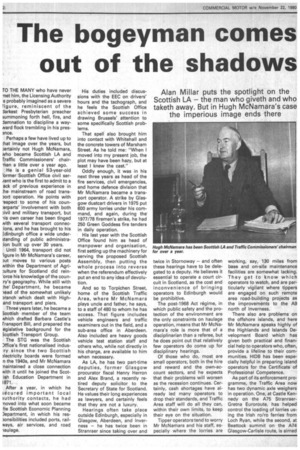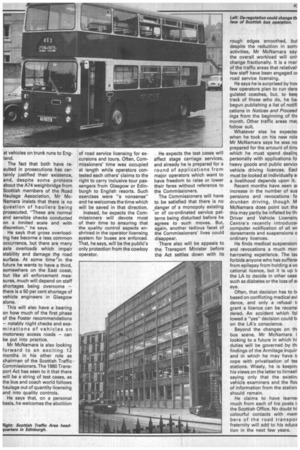The bogeyman comes out of the shadows
Page 44

Page 45

If you've noticed an error in this article please click here to report it so we can fix it.
Alan Millar puts the spotlight on the Scottish LA — the man who giveth and who taketh away. But in Hugh McNamara's case the imperious image ends there
TO THE MANY who have never -net him, the Licensing Authority s probably imagined as a severe Figure, reminiscent of the Jarkest Presbyterian preacher summoning forth hell, fire, and Jamnation to discipline a wayNerd flock trembling in his presance.
Perhaps a few have lived up to :hat image over the years, but 3ertainly not Hugh McNamara, Nho became Scottish LA and Traffic Commissioners' chair-nan a little over a year ago.
He is a genial 53-year-old former Scottish Office civil serrant who is the first to admit to a ack of previous experience in :he mainstream of road trans3ort operation. He points with -espect to some of his coun:erparts' involvement with both iviI and military transport, but us own career has been tinged Nith several transport connec:ions, and he has brought to his Edinburgh office a wide understanding of public administra:ion built up over 30 years.
Until 1964, transport did not igure in Mr McNamara's career, put moves to various posts Nithin the Department of Agriulture for Scotland did rein:orce his knowledge of the coun:ry's geography. While still with :he Department, he became lead of the somewhat unlikely )ranch which dealt with Highand transport and piers.
Three years later, he became a 3cottish member of the team Nhich drafted Barbara Castle's fransport Bill, and prepared the egislative background for the ;catfish Transport Group.
The STG was the Scottish )ffice's first nationalised indusry since the two Scottish .ilectricity boards were formed n the 1940s, and Mr McNamara -naintained a close connection rvith it until he joined the Scotish Education Department in 1971.
After a year, in which he ;ecured important local luthority contacts, he had noved into what soon became he Scottish Economic Planning )epartment, in which his res)onsibilities included ports, railNays, air services, and road laulage. His duties included discussions with the EEC on drivers' hours and the tachograph, and he feels the Scottish Office achieved some success in drawing Brussels' attention to some specifically Scottish problems.
That spell also brought him into contact with Whitehall and the concrete towers of Marsham Street. As he told me: "When 1 moved into my present job, the plot may have been hazy, but at least I knew the cast."
Oddly enough, it was in his next three years as head of the fire services, civil emergencies, and home defence division that Mr McNamara became a transport operator. A strike by Glasgow dustcart drivers in 1975 put 600 army lorries under his command, and again, during the 1977/78 firemen's strike, he had 250 Green Goddess fire tenders in daily operation.
His last year with the Scottish Office found him as head of manpower and organisation, first setting up the machinery for serving the proposed Scottish Assembly, then putting the whole process into reverse when the referendum effectively put an end to any idea of devolution.
And so to Torpichen Street, home of the Scottish Traffic Area, where Mr McNamara plays uncle and father, he says, to a staff of 480 to whom he has access. That figure includes vehicle engineers and traffic examiners out in the field, and a sub-area office in Aberdeen. Also included are heavy goods vehicle test station staff and others who, while not directly in his charge, are available to him when necessary.
As LA, he has two part-time deputies, former Glasgow procurator fiscal Henry Herron and Alex Brand, a recently retired deputy solicitor to the Secretary of State for Scotland. He values their long experiences as lawyers, and certainly feels that they are not a luxury.
Hearings often take place outside Edinburgh, especially in Glasgow, Aberdeen, and Inverness — he has twice been in Stranraer since taking over and twice in Stornoway — and often these hearings have to be delegated to a deputy. He believes it essential to operate a court circuit in Scotland, as the cost and inconvenience of bringing operators to Edinburgh would be prohibitive.
The post-1968 Act regime, in which public safety and the protection of the environment are the only constraints on haulage operation, means that Mr McNamara's role is more that of a disciplinarian than a referee, but he does point out that relatively few operators do come up for disciplinary hearings.
Of those who do, most are small operators, both in the hire and reward and the own-account sectors, and he expects that their problems will worsen as the recession continues. Certainly, cash shortages have already led many operators to drop their standards, and Traffic Area staff will do all they can, within their own limits, to keep their eye on the situation.
Tipper operators tend to worry Mr McNamara and his staff, especially where the lorries are working, say, 130 miles from base and on-site maintenance facilities are somewhat lacking. They get to know which operators to watch, and are particularly vigilant where tippers are engaged on such remote area road-building projects as the improvements to the A9 north of Inverness.
There also are problems on the offshore islands, and here Mr McNamara speaks highly of the Highlands and Islands Development Board which has given both practical and financial help to operators who, often, provide a lifeline to their communities. HIDB has been especially helpful in preparing island operators for the Certificate of Professional Competence.
As part of its enforcement programme, the Traffic Area now has two dynamic axle weighers in operation. One, at Castle Kennedy on the A75 StranraerGretna Euroroute, has helped control the loading of lorries using the Irish roiro ferries from Loch Ryan, while the second, at Beattock summit on the A74 Glasgow-Carlisle route, is aimed at vehicles on trunk runs to England.
The fact that both have resulted in prosecutions has certainly justified their existence, and, despite some protests about the A74 weighbridge from Scottish members of the Road Haulage Association, Mr McNamara insists that there is no question of hauliers being prosecuted. "These are normal and sensible checks conducted on a limited scale and with discretion," he says.
He says that gross overloading has become a less common occurrence, but there are many axle overloads which impair stability and damage flip road surface. At some time in the future he wants to have a third, somewhere on the East coast, but like all enforcement measures, much will depend on staff shortages being overcome — there is a 50 per cent shortage of vehicle engineers in Glasgow alone.
This will also have a bearing on how much of the first phase of the Foster recommendations — notably night checks and examinations of vehicles on motorway access roads — can be put into practice.
Mr McNamara is also looking forward to an exciting 12 months in his other role as chairman of the Scottish Traffic Commissioners. The 1980 Transport Act has seen to it that there will be a string of test cases, as the bus and coach world follows haulage out of quantity licensing and into quality controls.
He says that, on a personal basis, he welcomes the abolition of road service licensing for excursions and tours. Often, Commissioners' time was occupied at length while operators contested each others' claims to the right to carry inclusive tour passengers from Glasgow or Edinburgh to English resorts. Such exercises were "a nonsense" and he welcomes the time which will be saved in that direction.
Instead, he expects the Commissioners will devote most of their time to ensuring that the quality control aspects enshrined in the operator licensing system for buses are enforced. That, he says, will be the public's only protection from the cowboy operator. He expects the test cases will affect stage carriage services, and already he is prepared for a round of applications from major operators which want to have freedom to raise or lower their fares without reference to the Commissioners.
The Commissioners will have to be satisfied that there is no danger of a monopoly existing or of co-ordinated service patterns being disturbed before he agrees to such moves. But, again, another tedious facet of the Commissioners' lives could disappear.
There also will be appeals to the Transport Minister before the Act settles down with its
rough edges smoothed, bul despite the reduction in somi activities, Mr McNamara say: the overall workload will on', change fractionally. It is a marl of the traffic areas that relativel, few staff have been engaged or road service licensing.
He says he is surprised by hey few operators plan to run dere gulated coaches, but, to keel track of those who do, he ha: begun publishing a list of notifi cations in Notices and Proceed jogs from the beginning of thc month. Other traffic areas ma.y follow suit.
Whatever else he expecte( when he took on his new role Mr McNamara says he was no prepared for the amount of timi which he must spend dealinc personally with applications fo heavy goods and public servic( vehicle driving licences. Eacl must be looked at individually a: a livelihood depends upon it.
Recent months have seen ar increase in the number of sus pensions and revocations fo drunken driving, though M McNamara does point out tha this may partly be inflated by th, Driver and Vehicle Licensira Centre's recently introducer computer notification of all en clorsements and suspensions o ordinary licences.
He finds medical suspension and revocations a much mon harrowing experience. The lay forbids anyone who has sufferer from epilepsy from holding a vo cational licence, but it is up ti the LA to decide in other case such as diabetes or the loss of al eye.
Often, that decision has to bi based on conflicting medical evi dence, and only a refusal ti grant a licence can be reconsi dered. An accident which fol lowed a "yes" decision could b, on the LA's conscience.
Beyond the changes on th, bus scene, Mr McNamara i looking to a future in which hi duties will be governed by th, findings of the Armitage Inquir and in which he may have ti cope with privatisation of tes stations. Wisely, he is keepini his views,on the latter to himsell saying only that the existini vehicle examiners and the flay of information from the station should remain.
He claims to have learnel much from each of his posts ii the Scottish Office. No doubt hi colourful contacts with mem hers of the road transpor fraternity will add to his educa tion in the next few years.














































































































